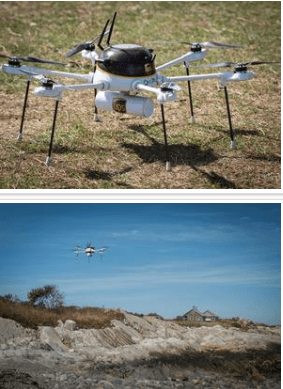Sep 26 2016
UPS® announced today that it has begun testing the use of drones to make commercial deliveries of packages to remote or difficult-to-access locations, working together with drone-maker CyPhy Works.
 Credit: UPS
Credit: UPS
Testing began on Thursday when the companies staged a mock delivery of urgently needed medicine from Beverly, Mass. to Children’s Island, which is about three miles off the Atlantic coast. The drone flight advances an investment made by The UPS Strategic Enterprise Fund in CyPhy to gather information about drone uses and capabilities.
“Our focus is on real-world applications that benefit our customers,” said Mark Wallace, UPS senior vice president of global engineering and sustainability. “We think drones offer a great solution to deliver to hard-to-reach locations in urgent situations where other modes of transportation are not readily available.”
Last month, the U.S. Federal Aviation Administration (FAA), issued new rules that expanded the uses of drones in commercial applications. Operators must adhere to important safety regulations. UPS believes these new rules are a step in the right direction. With the recent appointment of Captain Houston Mills, UPS Airlines’ director of safety, to the FAA’s new drone advisory committee, UPS intends to keep working closely with regulators to stay on the right path.
Innovation through automation and robotics has long been a focus for the world’s largest package delivery company. In fact, UPS has been testing drones in warehouses to check high storage racks to confirm stock or available space. The company also is exploring the use of drones to deliver humanitarian aid in hard-to-reach parts of the world.
“We’re thrilled to partner with UPS in this endeavor,” said Helen Greiner, CyPhy’s founder and chief technology officer. “Drone technology used in this way can save lives and deliver products and services to places that are difficult to reach by traditional transit infrastructures.”
The CyPhy drone used in Thursday’s test is the Persistent Aerial Reconnaissance and Communications (PARC) system. The battery-powered drone flies itself, so very little user training is required. It is extremely durable, has night vision and features secure communications that cannot be intercepted or disrupted.
UPS and CyPhy flew the PARC from Beverly to Children’s Island to test the viability of using the drone to make a time-critical delivery. In the mock scenario, the drone successfully carried an asthma inhaler to a child at a camp on the island, which is not reachable by automobile.
“UPS has a history of innovation that reaches back more than a hundred years,” Wallace said. “UPS uniformed employees remain a vital connection to our customers, but tests like these reveal a bridge to the future of customer service and urgent package delivery. We are continuously exploring ways to improve our network to efficiently support our customers’ demanding requirements.”